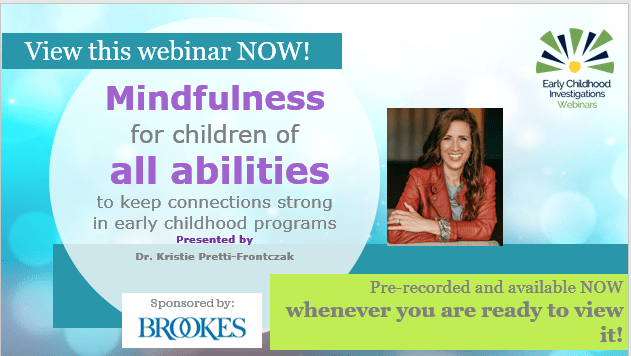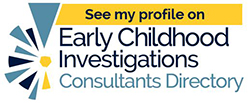Click here to register for free and watch on-demand.
All children need for their parents, caregivers, and educational professionals to “show up” and ensure they feel safe, seen, soothed, and secure. All children benefit when caregivers recognize and reduce stressors (big and small). This is because young children need our help learning how to self-regulate (which is about dealing with stressors not self-control). Our job in supporting children mindfully is to remain calm, even in the middle of a storm, to reduce stressors across the daily routine, and to help children process big emotions. When our caregiving efforts aim for connection over compliance, personalization over standardization, and building communities over creating competition, we can help all children thrive.
During this webinar, we’ll explore how all caregivers (parents, teachers, therapists) can embed mindfulness into their daily routines and activities to meet the needs of children, including those who are on IEPs and/or who may struggle with self-regulation skills (e.g., attention, interaction, recall). We’ll discuss how to differentiate and promote integration between a child’s thoughts, feelings, and actions. We’ll explore the zone of optimal learning and how to extend it for all children. We’ll also disucss how mindfulness supports brain development and how to take what we’ve learned and share with families and other caregivers, particularly during times when group care and educational opportunities are closed for public health and safety.
Objectives:
- Make connections between mindfulness and more familiar early childhood recommended practices
- Learn the how to manage the complexities of daily stressors on children’s learning and development
- Become more aware and responsive to stressors that impact a child’s ability to stay in the zone of optimal learning
- Gain an understanding of how to support families and other caregivers in helping children self-regulate
- How to use formal and informal ways of connecting with families and other caregivers to understand their child’s needs
Here are links so you can download my PPT slide deck:
- Click here if you want the “large print version (1 slide per page)
- Click here if you want 3 slides per page with lines to write version
Next, check out all of the resources referenced during the webinar.
(You can also download a printable version of the resources.)
- Four S’s
- A free package of three graphics and a PDF about the four “S’s” (safe, seen, soothed, secure) [link]
- A webinar where Barb Avila and I unpack the 4 “S’s” and apply them to a preschool context scenario for a child with autism [link]
- Coming Soon – guidance and tips for leaders on applying the 4 S’s with their staff
- Teach Before the Peak of the Storm
- Teach Before the Peak of the Storm Online Course: This online course takes you through what to do when emotions are difficult to control- whether that is before, during, or after the “storm”. It includes videos, transcripts, print materials, images, and tip sheets you can print and share (course completion certificate available). [link]
- Teach Before The Peak of the Storm Infographic: A free infographic that illustrates the three zones of arousal and how we need to “teach before the peak of the storm” [link]
- Helping Children Get Back to the Green Zone Infographic: A free infographic that illustrates 10 different lifelines that we can offer children when they are in the red and/or blue zones [link]
- Pre-K Teach & Play Podcast Episodes
- Episode 39: The Power of Showing Up with Dr. Dan Siegel and Autism Expert Barb Avila: This podcast explores how interpersonal neurobiology intersects with autism and the challenges of forming secure attachments when working with large groups of children.
- Episode 37: Wait For Green Before You Go: This podcast describes why our primary job is to extend the green zone for optimal learning, even when it comes to placement decisions for children who qualify for early childhood special education.It also discusses the two jobs teachers have…the one when children are in the green zone and then one when they aren’t.
- Podcast 33: Are You Teaching Coping Mechanisms or Strategies? Why the Difference Matters to Children’s Emotional Well-Being: This podcast delves into the difference between coping mechanisms and coping strategies, what self-regulation is (and isn’t), and myths about how children learn to become increasingly self-regulated.
- Podcast 29: Stop, Think, Act: Promoting Self-regulation in Young Children: This podcast examines the importance of self-regulation, common myths or misperceptions about self-regulation, and why our job is critical in ensuring children’s success in school and of course in life.
- Podcast 24: Cultivating Mindfulness: Brain Reasons and Mind Methods for Early Educators: This podcast covers teaching with the brain in mind by going deeper into mindfulness, as well as how mindfulness is a key part of building children’s brains and how we can create and embed opportunities throughout our daily routine.
- Other Related and/or Referenced Resources
- Eight Mindfulness Strategies for ECE Classrooms: This blog discusses eight mindfulness strategies for the early childhood classroom, and offers exciting alternatives to typical child guidance procedures.
- A “Brain Architect’s” Guide for Reducing ECE Stressors: This handout describes how to reduce early childhood stressors by using words wisely, soothing the system, “reducing” to “restore”, and readying yourself.
- 10 Ways to Reduce Stressors So Curiosity Can Thrive in Children with Autism: This handout unpacks ten specific strategies you can use to support children with autism to help them stay engaged and curious.
- Building Brains Isn’t a Job for the Faint of Heart: A blog post from Dr. Kristie Pretti-Frontczak that includes links to all of her resources for teaching self-regulation.
- Strategies for naming, taming, and reframing [blog] – even more coming soon
- Re-frame around trauma-informed care [blog]
- Brene Brown’s definition of empathy [video]
Links to various experts whose work was mentioned or drawn upon for the webinar (alphabetical order):
- Barb Avila – synergyautismcenter.com
- Alyssa Blask Campbell – seedandsew.org
- Beth Diedrick – facebook.com/mrsdiedrick
- Janice Fialka – danceofpartnership.com
- Laura Fish – consulting.laurafishtherapy.com
- Ijumaa Jordan – ijumaajordan.com
- Megan McClelland – health.oregonstate.edu/people/megan-mcclelland
- Tina Payne Bryson – tinabryson.com
- Mayra Porrata – theflourishingway.com
- Dan Siegel – drdansiegel.com
- Stuart Shanker – self-reg.ca/
- Shauna Tominey – creatingcompassionatekids.org
- Lynn Ungar – lynnungar.com/poems/breathe

